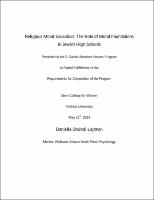Please use this identifier to cite or link to this item:
https://hdl.handle.net/20.500.12202/4053Full metadata record
| DC Field | Value | Language |
|---|---|---|
| dc.contributor.author | Lejtman, Daniella Shaindi | - |
| dc.date.accessioned | 2018-11-05T19:53:14Z | - |
| dc.date.available | 2018-11-05T19:53:14Z | - |
| dc.date.issued | 2014-05 | - |
| dc.identifier.uri | https://hdl.handle.net/20.500.12202/4053 | - |
| dc.identifier.uri | https://ezproxy.yu.edu/login?url=https://repository.yu.edu/handle/20.500.12202/4053 | |
| dc.description | The file is restricted for YU community access only. | - |
| dc.description.abstract | The development of different moral systems is a widely discussed topic. Traditionally, psychologists have viewed the development of morality through the lens of cognition and reasoning (e.g. Piaget (1965), Kohlberg (1969), Gilligan (1982)). Others (e.g. Values Clarification Theory) propose that moral values are developed through the integration of rational thought and social context. An innovative approach to morality, the socialintuitionist model, has been suggested by Dr. Jonathan Haidt (2001) and has become the stimulus for the Moral Foundations Theory (Haidt & Joseph, 2006). The Moral Foundations Theory puts forth that morality is inherently intuitive and contains at least five core foundations: Care/Harm, Fairness/Cheating, In-group Loyalty/Betrayal, Authority/Subversion, and Purity/Degradation. This empirical study attempted to determine if religious moral educators in Jewish high schools had any effect on their students’ composition of moral foundations. Additionally, the study attempted to determine if the specific moral foundations would be determined by the self-identified religious stances of the participants. Results showed that the only significant interaction between student cohorts and teacher cohorts was the decline in score of the moral foundation Purity/Degradation from 9th grade to 12th grade, relative to the faculty score. These results imply that religious moral education may play a role in decreasing students’ proclivity towards the moral foundation Purity/Degradation. Results also showed that religious level was significantly associated with the moral foundations of Care/Harm, Authority/Subversion, and Purity/Degradation. Post hoc test results revealed that self-identified more religious participants scored significantly higher in these three foundations. These results imply that religion is crucial in defining the arrangement of a person’s specific moral foundations. | en_US |
| dc.description.sponsorship | S. Daniel Abraham Honors Program | en_US |
| dc.language.iso | en_US | en_US |
| dc.publisher | Stern College for Women | en_US |
| dc.rights | Attribution-NonCommercial-NoDerivs 3.0 United States | * |
| dc.rights.uri | http://creativecommons.org/licenses/by-nc-nd/3.0/us/ | * |
| dc.subject | Jewish day schools. | en_US |
| dc.subject | Jewish religious education of teenagers. | en_US |
| dc.subject | Jews --Education (Secondary) | en_US |
| dc.subject | Moral education (Secondary) | en_US |
| dc.subject | Orthodox Judaism. | en_US |
| dc.subject | High schools. | en_US |
| dc.title | Religious Moral Education: The Role of Moral Foundations in Jewish High Schools | en_US |
| dc.type | Thesis | en_US |
| Appears in Collections: | S. Daniel Abraham Honors Student Theses | |
Files in This Item:
| File | Description | Size | Format | |
|---|---|---|---|---|
| Daniella Lejtman.pdf Restricted Access | 272.38 kB | Adobe PDF |  View/Open |
This item is licensed under a Creative Commons License

